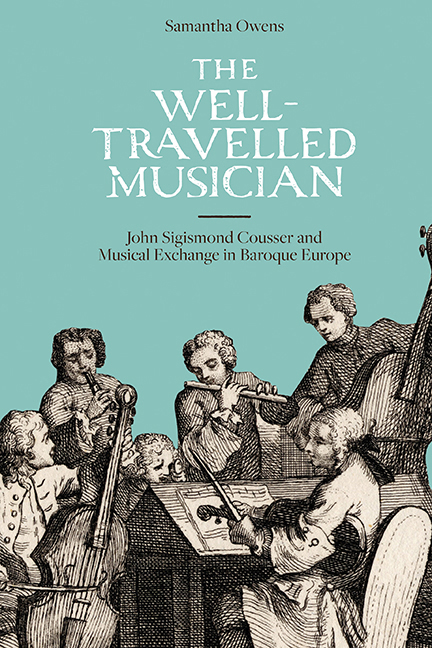Book contents
- Frontmatter
- Dedcation
- Contents
- List of Tables
- Preface
- Abbreviations
- Notes on Sources
- Introduction: John Sigismond Cousser and his ‘Commonplace Book’
- 1 Hungarian Beginnings and the Adoption of French Musical Style
- 2 Kapellmeister at the Wolfenbüttel Court and Braunschweig Opera House
- 3 Ariadne to Porus: Cousser's Braunschweig Operas
- 4 ‘The Incomparable Director’ in Hamburg, Nuremberg and Augsburg
- 5 Heliconische Musen-Lust: Opera at the Württemberg Court
- 6 ‘Il Paradiso terrestre’? Cousser in London
- 7 ‘Fortune not Blind’: Music for Dublin Castle
- 8 ‘Our Concert’: A Musician at Home
- 9 Cousser's ‘collection of fine musick’ and the Practicalities of Musical Exchange
- Appendix 1 Summary of the Contents of Cousser's ‘Commonplace Book’
- Appendix 2 Cousser's Address Book
- Appendix 3 Cousser's Books of Cantatas, Madrigals, Duets and Serenatas
- Appendix 4 Cousser's Inventory of Ouverture Incipits
- Appendix 5 Transcription of Cousser's Notes for his 1716 Trip to London and the Continent
- Bibliography
- Index
- Titles listed here were originally published under the series title Music in Britain, 1600–1900
- New titles published under the series title Music in Britain, 1600–2000
9 - Cousser's ‘collection of fine musick’ and the Practicalities of Musical Exchange
Published online by Cambridge University Press: 30 August 2019
- Frontmatter
- Dedcation
- Contents
- List of Tables
- Preface
- Abbreviations
- Notes on Sources
- Introduction: John Sigismond Cousser and his ‘Commonplace Book’
- 1 Hungarian Beginnings and the Adoption of French Musical Style
- 2 Kapellmeister at the Wolfenbüttel Court and Braunschweig Opera House
- 3 Ariadne to Porus: Cousser's Braunschweig Operas
- 4 ‘The Incomparable Director’ in Hamburg, Nuremberg and Augsburg
- 5 Heliconische Musen-Lust: Opera at the Württemberg Court
- 6 ‘Il Paradiso terrestre’? Cousser in London
- 7 ‘Fortune not Blind’: Music for Dublin Castle
- 8 ‘Our Concert’: A Musician at Home
- 9 Cousser's ‘collection of fine musick’ and the Practicalities of Musical Exchange
- Appendix 1 Summary of the Contents of Cousser's ‘Commonplace Book’
- Appendix 2 Cousser's Address Book
- Appendix 3 Cousser's Books of Cantatas, Madrigals, Duets and Serenatas
- Appendix 4 Cousser's Inventory of Ouverture Incipits
- Appendix 5 Transcription of Cousser's Notes for his 1716 Trip to London and the Continent
- Bibliography
- Index
- Titles listed here were originally published under the series title Music in Britain, 1600–1900
- New titles published under the series title Music in Britain, 1600–2000
Summary
❧ Cousser's Music Collection
DURING the early modern period, assembling a sizeable and functional music collection came at a significant cost in terms of writing materials, candles and personnel. For many professional musicians, then, a private collection represented a source of considerable capital, essential not only for establishing and maintaining artistic credibility and gaining future employment, but frequently also providing a form of life insurance for bereaved family members. In 1695, for instance, Cousser's recently-widowed mother, Maria Elisabetha Kusser, offered her late husband's music collection to Duke Eberhard Ludwig of Württemberg in return for a small annual pension. It seems likely that Ján Kusser's activity as a music collector provided a model for his son, who over the course of his career expended a great deal of time and effort assembling his own correspondingly large music collection. Yet unlike evidence provided by auction catalogues or inventories compiled after a death, Cousser's music collection cannot be documented at any one set point in time or place. Instead, we must rely on the disparate information concerning repertoire that Cousser included in his notebook, which contains a somewhat bewildering selection of more than 1,000 references to individual items of music. It is clear from this source that Cousser's library was extremely wide-ranging, in terms of both the composers and the genres represented, featuring printed and manuscript works by French, English, German and Italian authors and including arias, cantatas, serenatas, operas, madrigals, dances, ouverture suites, concertos and sonatas, mass settings, motets, folk song arrangements and much more besides.
By no means was the size or extent Cousser's collection unique, however. One of his contemporaries in London, his compatriot Johann Christoph Pepusch, has been described as one of the first in England to ‘take a scholarly and systematic approach to the acquisition of music and books about music’ and, in the process, was ‘responsible for the establishment and operation of no fewer than three important music libraries’. Similarly, when, in 1724, William Corbett's ‘choice Collection of Musick’ was advertised as being for sale, it apparently comprised ‘Several hundred of original manuscripts of Latin Psalms, Opera's, Cantata's, Solo's, and Concerto's, never heard or seen in England, all composed by the most eminent Masters’
- Type
- Chapter
- Information
- The Well-Travelled MusicianJohn Sigismond Cousser and Musical Exchange in Baroque Europe, pp. 162 - 182Publisher: Boydell & BrewerPrint publication year: 2017



